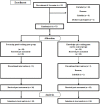Small Acute Benefits of 4 Weeks Processing Speed Training Games on Processing Speed and Inhibition Performance and Depressive Mood in the Healthy Elderly People: Evidence from a Randomized Control Trial
- PMID: 28066229
- PMCID: PMC5179514
- DOI: 10.3389/fnagi.2016.00302
Small Acute Benefits of 4 Weeks Processing Speed Training Games on Processing Speed and Inhibition Performance and Depressive Mood in the Healthy Elderly People: Evidence from a Randomized Control Trial
Abstract
Background: Processing speed training using a 1-year intervention period improves cognitive functions and emotional states of elderly people. Nevertheless, it remains unclear whether short-term processing speed training such as 4 weeks can benefit elderly people. This study was designed to investigate effects of 4 weeks of processing speed training on cognitive functions and emotional states of elderly people. Methods: We used a single-blinded randomized control trial (RCT). Seventy-two older adults were assigned randomly to two groups: a processing speed training game (PSTG) group and knowledge quiz training game (KQTG) group, an active control group. In PSTG, participants were asked to play PSTG (12 processing speed games) for 15 min, during five sessions per week, for 4 weeks. In the KQTG group, participants were asked to play KQTG (four knowledge quizzes) for 15 min, during five sessions per week, for 4 weeks. We measured several cognitive functions and emotional states before and after the 4 week intervention period. Results: Our results revealed that PSTG improved performances in processing speed and inhibition compared to KQTG, but did not improve performance in reasoning, shifting, short term/working memory, and episodic memory. Moreover, PSTG reduced the depressive mood score as measured by the Profile of Mood State compared to KQTG during the 4 week intervention period, but did not change other emotional measures. Discussion: This RCT first provided scientific evidence related to small acute benefits of 4 week PSTG on processing speed, inhibition, and depressive mood in healthy elderly people. We discuss possible mechanisms for improvements in processing speed and inhibition and reduction of the depressive mood. Trial registration: This trial was registered in The University Hospital Medical Information Network Clinical Trials Registry (UMIN000022250).
Keywords: cognitive training; depression; inhibition; processing speed training; video game.
Figures


 : squilla) is presented. The five pronunciations are presented. In the case, the first pronunciation is dojyou (
: squilla) is presented. The five pronunciations are presented. In the case, the first pronunciation is dojyou ( : loach), the second pronunciation is saba (
: loach), the second pronunciation is saba ( : mackerel), the third pronunciation is kaba (
: mackerel), the third pronunciation is kaba ( : hippopotamus), the fourth pronunciation is iwana (
: hippopotamus), the fourth pronunciation is iwana ( : char), the fifth pronunciation is syako (
: char), the fifth pronunciation is syako ( : squilla). Participants are asked to select the corrected pronunciation of the target Kanji (in this case, the corrected answer is the fifth pronunciation: syako).
: squilla). Participants are asked to select the corrected pronunciation of the target Kanji (in this case, the corrected answer is the fifth pronunciation: syako).References
LinkOut - more resources
Full Text Sources
Other Literature Sources

